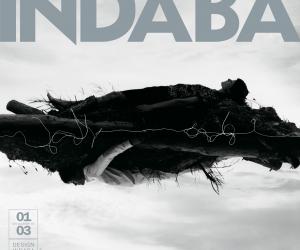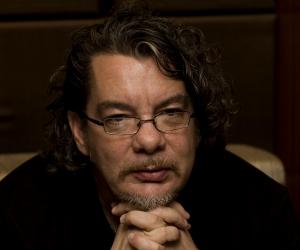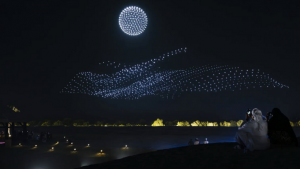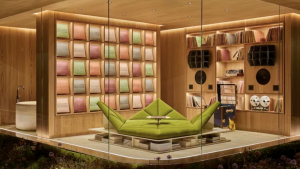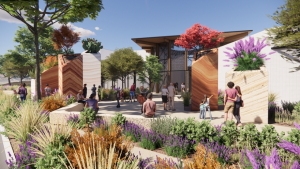First Published in
I am giving this lecture at a critical juncture, not only in our industry, but in the history of mankind and this planet. Decisions taken now will affect all of our futures, and we could all have an impact on those decisions if we wish.
We stand at the threshold of a period of astonishing fruitfullness for our race. we stand at the point where we can regrasp the tools of our industry and use them for creative and human means. We stand at an opportunity to remodel our business approach to become an inclusive one, a new model that will enable the disenabled of this planet to empower themselves.
This talk is about a statement of need to hold a clear vision and thought about what is going on around us in the world at this present moment, and the pressing urgency to define our function as designers and human beings within it.
In a way, it is a kind of footnote to the lecture I gave here in 2001.
We are defined by the language we use, and as I come to write this lecture, I am struck how the use of words, and how my own thinking and listening, have been carefully honed and edited for the present day.
I am also struck by how I feel, right now, in my professional life. I appear to be treading water, without having realised it, the engine just turning over, and that (everywhere I look) all around me is the same.
I am also shocked to realise that I have a sense that there is no longer any danger from within our culture, but only a new all-encompassing sense of perceived danger from without. In this all-pervasive sense of entrenchment, we are all in a state of high alert, and any resistance is felt to be treachorous.
In being asked to produce a lecture at the last minute, my (unconscious) inner being is thrown into relief, and I see a queasy internal state of edginess, nervousness, insecurity and fear complemented by a stong desire for a place of peace and harmony.
This constant low-level global anxiety is getting to me, and I can't rest (in peace). My intentions are less clear than ever before, my role uncertain, and I am no longer sure of the questions to ask. (This process of assembling a lecture has the instant effect of highlighting your particular frame of mind, and forces to ask you questions about your beliefs, observations and intentions at any particular point of time.)
Peace
The single most important word missing from the debate about war is peace. The talk is all about war or no war, anti-war, ultimatums and the need to disarm forcefully. We could be talking about peace, love, harmony, democracy, listening, redistribution, empowerment, equality, opportunity, generosity, compassion, care, acceptance, respect, people. Instead, we talk in threats, we stomp our feet and the hungry get trampled.
Language
We are defined by the language we use. All language is definition, an understanding of commonly defined concepts that are converted into objects by using aural and visual signs that we, broadcaster and receiver, have agreed upon. this contract is binding, and allows for little ambiguity. The ultimate product of this simplification process ends up as just pure duality - opposites, opposition.
1.0, black white, up down, light dark, life death, us them. War. No room for inclusiveness.
We are defined by the language we use, and to use other words becomes a breach of contract. sometimes it is more important to look at the words we don't use, instead of seeing only the ones we do. The current rhetoric is precise, we all know the words in use. (They are all negative. recession, or fighting recession; war, or fighting war; fight or be fought).
We are defined by the language we use. Peace, love, harmony, equality, distribution, opportunity, respect, empowerment, generosity, compassion, care, people.
I keep coming back to these words. Almost like a nostalgia, I miss their presence. The words we use betray our culture, and the lack of these positive aspirations in our daily thoughts and conversations betrays a state of worn down acceptance of the global staus quo. We need to remind ourselves again.
Love
If language is the way we describe ourselves, then something is missing. (Could it be love?).
Harmony
The obsession with opposites leaves little room for the human. we are numbers for or against, fed or to be fed, begging or giving, and as war looms, we decamp to our trenches, treading water until the dark clouds pass
Fear
This debate has cast a shadow over everything. We currently live in a state of constant fear, of constant anxiety. In recent weeks, our lives have been filled with preparations for war. With horror.
I constantly hear the phrase 'short-term' around me. This one phrase seems to justify all the inaction and waiting, the retreat behind closed doors and the consensual preparation for war. Clients cancel projects for fear of their shareholders judgments, customers stop buying for fear of an uncertain future. Politicians talk about a fast war, fast food strategies at the war front.
The side product of all this delay and public inaction is a pruning of the design industry. Ironically, the first victims of recession are the image makers. Our industry is bloated, and needed some editing. The only tragedy is when good studios disappear alongside the ones who added nothing to our culture.
(My London studio is currently in crisis. We have little or no work right now. While this is partly as a result of clear business decisions, we have opened new studios in other countries where we were doing work and that work is now produced by the local studio, there is also a massive sense of something else going on).
What is going on is a state of waiting. Our clients are waiting. Waiting on a clear sign or another with regards to whether or not they can spend their money, and how they can spend it. The sign which they await is vague, nebulous, but is a result of perceived recession and impending war.
The heart of the matter is fear. Fear to spend, fear to take risks, fear to not take risks, fear of not knowing.
Fear is all around, and we are showered by it constantly (in this rush to justify the total insanity of war) and brainwashed into a grudging support. All our decisions are then made from this place, which is hardly a good basis for a compassionate approach.
We feel so helpless. Post 9-11, pre Iraq, mid recession. I quote from this week's Newsweek: "We are living in a chronic heightened state of alertness and helplessness prompted by a poorly defined danger that could strike at any time in any form without warning." Such feelings can be as unhealthy as they are unpleasant, impairing immunity, interrupting sleep and exacerbating everything from acne to ulcers. "The psychological state of fear affects us biologically."
I went on the recent anti-war demonstration in London, and the feeling of being part of the amassing of so many like- minded individuals was overwhelmingly moving. These events used to be called peace rallies, and the people behind them were peace movements. Today, the political response was to describe this popular uprising as a display of weakness that the enemy would use against us. Anti-war is a lost battle, but peace is undeniable.
Opposition
The list of opposites continues - have have-nots, obese starving, entitled denied, empowered disempowered.
How do we perfect this model? It is largely a branding exercise, but played on a massive scale. The front line in the dna of social identity are the global everyday, everywhere, everytime brands. These high street emblems ensure that we all share the same tastes and aspirations. From the logo on the back of your jeans to the money you invest, our lives depend on the received perceptions of a brand. From Eminem to CNN, from Starbucks to Star Wars. This supposedly represents free-choice. Our children are spoonfed prepackaged fodder, we are all battery farmed.
We are required to live in a polarised place. Belief against liberalisation, attack against defence, hoping against hope. This dualism becomes a bondage of opposites, you have to choose your side and surrender your individuality. Join the club and wear the badge. These opposites soak us and sap our strengths.
Obesity and starvation, love and blame, addiction and independence, war and anti-war. Design and chaos.
corporate tyranny of our own society goes unchallenged. Control of the technology and the point of sale is the key, and whoever holds the keys, controls the distribution and the choice. The videos we can watch, the music we can download, the books we can access. All of this represents the new battlefield, a battlefield of access.
Cultural paralysis
This state of fear also affects us culturally. We can no longer even imagine cultural risks, let alone take them. The airwaves are filled with reality tv, our high streets are filled with cappucino. Our differences are ironed out in the national imperative to become a perfect model of global polarisation. Culture becomes soft and homogenised, and our options are reduced to a few safe choices provided by a few safe corporations. Friendly fire, and cultural rationing. You see, how can you have an true enemy if you share some of their attributes? How can you fight a mirror image? So, we are forced into Opposition, and perfect the model of western liberalisation against tyrannical impoverishment, neatly sidestepping any difficult grey matter, like the disempowered 80% of the world's population. We spend $100bn on arms that leave people starving. As we stomp our feet we trample on the unfed.
War
War itself is the ultimate branding exercise, and where it all began. We see the same tribal flag waving echoed in sports. Branding is a hangover from the feudal wars of the middle ages and earlier, and so we parade behind the adopted family banner of our birth and march forward into ideological battle, a new colonial crusade. And if the difference between the apparent enemies today is not that easily apparent, then we can always raise the fear stakes to an apocalyptic level.
Peace, love, harmony
Difference
The real enemy of war is difference. The difference to object, oppose, ignore, hope, talk, act. We can say what we want, but society has a way of closing us down, rendering our actions as unpatriotic, or, worse, threatening. Rendering our compassion as rant, our peace as weakness and our hope as innapropriate and untimely. War presses the button of loyalty, no-one will easily question the ethics of those in power at a time of battle, and those who do are labelled treasonous. This time, though, it may be different.
And we condemn the different. Those who think differently become the axis of evil. Those who do not serve us, who do not hold our own interests at heart, are perceived as enemies. The fact that most corporations do not hold our own interests at heart is apparently a point too obvious to be acknowledged, as is the idea that we are not fighting for our own beliefs, only against the beliefs of others. Enron has shown that our land of freedom and fairness is a mirage.
Choice
The outcome of all this simplification and social and cultural reductionism is a kind of living mediocrity, where there are no highs or lows, just concensus. The victims of war are choice and culture. Culture is difference, all else is the average. In the race to globalise, everything is made the same, and the pattern of homogenised goods and taste seep everwhere. The real battle is one for your minds, and then your pockets, and the intense spin and level of disinformation leaves us in lethargic confusion.
But we do have a choice. We can reject the menu, the choices on offer. We can choose to be aware, and to stop consuming without thinking. We can choose to protest, and stop war. We can choose to give, and stop suffering, we can choose to share, and stop inequality, and we can choose to love, and stop inhumanity.
No future
We have now outlived the science fiction dreams of our forefathers (and found them to be lacking, the self-fulfilling prophesy of our fantasies, science and knowledge - the ultimate escape) and we no longer pin all our hopes on a better future. This is part of the malaise. Our political scepticism prevents us from believing in a better world, yet we don't have the courage to imagine an alternative. We need to live in the present moment, and to experience the joy of life. I don't mean live for the moment, but I do mean to grasp the splendour of what we have. And to step forward in partnership.
Risk
We can choose to take new risks, ones that challenge normality. Not just technological risks, but creative ones, ideological risks. (Johnny Rotten said that social culture post-punk was far worse than before it).
The smokescreen of war and recession blind us to these real enemies of today; mediocrity, inequality, poverty, disinformation, lack of real courage. I don't mean courage to go to war, I mean the courage to change things. As our cultural bandwidth is narrowed, and safety creates a state of sleepwalking, this state of cultural zombification where our protests are gagged in the name of national security needs to be confronted.
We need to confront this state of riskless mediocrity, our daily reality show of meaningless pattern, a bland, worn sandbar of joyless cultural reproduction, fuelled by this controlling fear of attack from the outside, of the easy psychological weapon of threat against our security. Life is risk, let us revel in it.
What we need is love
Underground
In my youth, there was an alternative, a cultural place where like-minded people could assemble their ideas and expressions which challenged the notions of society at large. Today, the Underground has all but disappeared. This is another word that we no longer hear. Underground, Sub-culture, Revolution, People power, Love. Our language betrays us again. It is time to form a new underground, a new alternative, not just a new age. Not a hippy commune, but a different and inclusive cultural and business model. We could be shocked at the outcome.
The internet does have underground networks and forums, and politics is often altered by them, but somehow these virtual societies remain invisible to the public at large. Real political awareness is not something that most people engage in today, despite our implication in life or death decisions.
Joy
We mistake contentment for joy, as branding controls our desires. Joy seems to be out of place in today's solemn state of mind, we need to rediscover these pure emotions and employ them in our creativity and communications.
People
People matter. We are so often wrapped up in our own skills and the desire to display them, or the drive for success, that we can forget that our output has an immediate impact on the world around. Our intentions are broadcast. If we produce decorative work, then we help create a superficial culture. When we think of a client or customer, we usually see only someone we need to pursuade to buy something.
We could engage the viewer and take the risk that our message can be changed. Not like the facade on a Nokia phone, but a real, fluid process where the individuality of the user can make a real difference.
Digital culture can allow this.
Acceptance
We believe in a better future, but maybe we have everything we need right here right now. We suffer because we imagine a better place than this. even when all is well, we fear the future. we fear extinction. There is simply not enough in our world to satisfy this craving. This is where inequality is born, in the drive to amass provisions to sate our fears.
All of this fear has protectionism at its base. We are driven to attain, and then to protect what we have for fear of losing it. The fear of loss drives us to try to attain infinitely - in reality, there is no limit to what it would take to sooth our insecurity. None of it works, we are protected momentarily before seeking the next thrill or the next dollar. Consuming is all about promise, the promise of security or escape from the need to fear.
Today's business model is based entirely on this, a strategy of inequal distribution, the survival of the fittest, gone mad. If we are to create a better society, one with greater access to a healthy way of life and self sufficiency, we will need to have the will to implement a new structure, one based on a collective model. And we will need to be willing to share our skills, and train others to join us. Education is the key, and open access is the gateway.
Design
So, what place design in this brave new world? This crossroads of intention is probably the most difficult one we have had to face. Computers have enabled a large proportion of the already accessed world to create their own professional appearing communications. Packaging has hijacked content, information has become the unquestionable excuse to justify the communications pollution we have to wade through daily.
My personal data, either through credit card usage, internet activity, mobile phone use, product registration forms, travel, is logged, detailed, analysed and exploited and then used to target me through controlled and personally-tailored messaging wishing to sell me goods.
Design is the packaging, and it is the means of communication, but it can also be a question. It can communicate dangerous ideas, it can take creative risks, it can confront the cultural tyranny of our society.
In the current climate, the role of design is more confused than ever. But this can be an opportunity, a space to consider a new role for design. In this commercial climate, design is forcibly freed from its commercial shackles and allowed to return to its root as a public service, and we have then the possibility of it being a tool to revitalise culture. Design is today the best placed medium to work with technology creatively. Not a search for new tricks, but the opportunity to really engage with its audience through an interactive approach to media.
(Re)distribution
With the right will, we as a planet have everything we need for the welfare of all. There is enough energy, enough food, water, space, medicine, bandwidth, air, for all. All it takes is the willingness to share it out. I just find it so difficult to contemplate war in a world where 200,000 children die every week from preventable causes. I cannot supply you with any real answers today, only directions for thought. I cannot solve for myself the route that I should personally follow. All I can hope for is to step forward with awareness, and to promise myself to constantly remember a few words. Risk, (com)passion.
Craft
One wonderful thing is that we could see a return to hand crafts. Technology, and the drive to embrace it, has meant that we have forgotten another word, craft. It seems such an old fashioned concept. Few of us sitting here today have learnt to draw, even less to paint or make objects. Those of us who have learnt, have lost these skills or rarely use them in our work.
Even in music, sound is designed. sampled and restructured. The need for accoustic music and analogue design has never been greater. The human touch is missing, and we yearn for the technology to melt and touch us, for real contact to be re-established. We long for real emotion, feeling, open speech.
We always have the chance to embrace a new approach, and there has never been a more critical time to do this than now. We have to be courageous, to embrace our fellow human being, trust our own hands and feelings. We have to create our own laboratories to experiment in and be prepared to (re)learn new skills.
Lectures like this are always difficult, because real human existence lies in the space between words, in the undefinable space beyond language. But we know it is there, and not simply a formula that needs solving. The only choice is to engage directly with the wider human experience and to get caught up in the whirlwind of humanity and life.
Peace, love, harmony.
Thank you.
What we need is love.
Let's make this world a better place.





